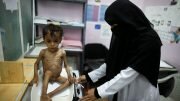By the end of 2016, 89,195 refugees in Norway had found a job, which is 47.4 percent among refugees aged 15 to 66. Out of the entire Norwegian population of the same age, the proportion of employed people was 71 percent, which makes a difference of 23.6 percent. These numbers come from a new report by Statistisk sentralbyrå (SSB) called ‘Refugees in and outside the labor market 2016’. The report is based on statistics from November 2016 and includes family immigrants to refugees in the refugee group.
There have been minor changes in the employment share from 2015 to 2016, according to the report. Among refugees, there has been a decline of 0.7 percent, while the total population experienced a decrease of 0.2 percent.
Length of residence has big impact
SSB shows that, as before, the length of residence in Norway has a significant impact on the employment level. For refugees who have lived in Norway for four to six years, 46 percent has a job. Those who have lived in Norway for seven to nineteen years, 52-56 percent has a job. Among those who have lived in Norway for 20 years or more, the number is just over 60 percent. There is also a difference between the men and women. For men, the employment rate is 49.7 percent, while for women it is 44.6 percent. The corresponding difference for the entire population is 2.8 percent in favor of men.
Big differences in country groups
The number of employment also varies between the country groups. Refugees from Sri Lanka, Bosnia Herzegovina and Chile are among the groups with the highest employment rate, respectively, 72, 67.7 and 65.7 percent. Refugees from Somalia and Sudan are among the lowest-performing groups, 33 and 30.3 percent respectively. The lowest-ranked group by the end of 2016 was Syrian refugees, with an employment rate of 13.6 percent, a decline of 4.3 percent from 2015.
Doubled last year
The figures for Syrian refugees, however, must be seen in the context of the large number of recently resettled refugees, which doubled in 2016. When looking at Syrian refugees with three years of residence, the proportion rises to 38.4 percent. Among refugees from Syria who have lived in Norway for four to six years, the share is 53.2 percent.
Employment is defined by SSB as a person who received income taxation for at least one hour work per week, which includes those who have a job but who were temporarily absent due to illness or similar reasons.
© NTB Scanpix / Norway Today




